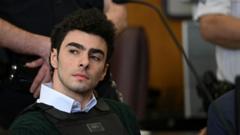In a recent hearing, Mangione's case amidst ideological motivations related to healthcare spurs significant public discourse.
Luigi Mangione Reads Not Guilty Plea in UnitedHealthcare CEO Murder Case

Luigi Mangione Reads Not Guilty Plea in UnitedHealthcare CEO Murder Case
Luigi Mangione faces federal murder and stalking charges over the death of UnitedHealthcare's CEO, Brian Thompson, committing to a not guilty plea.
Luigi Mangione, the 26-year-old accused of murdering UnitedHealthcare CEO Brian Thompson, pleaded not guilty to federal charges including murder and stalking during a court appearance in Lower Manhattan. His plea comes after being accused of the shooting outside a hotel in December of last year. If convicted, prosecutors are seeking the death penalty, alleging that the murder was an act of political violence intended to amplify messages against the health insurance industry.
During his arraignment, Mangione, dressed in prison attire and shackled, confirmed to the judge that he had reviewed the indictment before stating his plea. On the same day, federal prosecutors formally filed for capital punishment, emphasizing that they view Thompson's killing as a severe ideological act. U.S. Attorney General Pam Bondi has previously categorized the shooting as “an act of political violence,” leading to heightened scrutiny of the motivations behind the crime.
Mangione’s defense attorneys criticized the potential for the death penalty, labeling it "barbaric" and expressing concerns over the fairness of the trial. The proceedings lasted 35 minutes, with Judge Margaret Garnett working on creating a pre-trial schedule despite ongoing objections from Mangione's lawyers regarding the indictments. The amount of evidence presented, estimated at "three terabytes," requires significant time for thorough review, postponing the trial likely until 2026. A subsequent court appearance is scheduled for December 5, when a trial date will be officially set.
Attorney Karen Friedman Agnifilo argued for Mangione’s case to be heard in federal court first, citing constitutional implications of being tried in state court where charges also exist in Pennsylvania and New York. Amidst the legal tussles, she raised alarms about state prosecutors possibly eavesdropping on privileged communications with her client. The judge requested clarification from prosecutors regarding proper protocols for Mangione’s access to confidential attorney-client conversations.
The murder of Brian Thompson not only resulted in legal ramifications for Mangione but also ignited significant public discussion concerning the frustrations surrounding the privatized healthcare system. Some individuals even perceive Mangione as a “folk hero,” leading to a substantial crowdfunding effort that has raised nearly $1 million for his defense. Supporters gathered outside the courthouse as the trial developments continue to reflect the complex intersections of healthcare, justice, and ideological beliefs in American society.
During his arraignment, Mangione, dressed in prison attire and shackled, confirmed to the judge that he had reviewed the indictment before stating his plea. On the same day, federal prosecutors formally filed for capital punishment, emphasizing that they view Thompson's killing as a severe ideological act. U.S. Attorney General Pam Bondi has previously categorized the shooting as “an act of political violence,” leading to heightened scrutiny of the motivations behind the crime.
Mangione’s defense attorneys criticized the potential for the death penalty, labeling it "barbaric" and expressing concerns over the fairness of the trial. The proceedings lasted 35 minutes, with Judge Margaret Garnett working on creating a pre-trial schedule despite ongoing objections from Mangione's lawyers regarding the indictments. The amount of evidence presented, estimated at "three terabytes," requires significant time for thorough review, postponing the trial likely until 2026. A subsequent court appearance is scheduled for December 5, when a trial date will be officially set.
Attorney Karen Friedman Agnifilo argued for Mangione’s case to be heard in federal court first, citing constitutional implications of being tried in state court where charges also exist in Pennsylvania and New York. Amidst the legal tussles, she raised alarms about state prosecutors possibly eavesdropping on privileged communications with her client. The judge requested clarification from prosecutors regarding proper protocols for Mangione’s access to confidential attorney-client conversations.
The murder of Brian Thompson not only resulted in legal ramifications for Mangione but also ignited significant public discussion concerning the frustrations surrounding the privatized healthcare system. Some individuals even perceive Mangione as a “folk hero,” leading to a substantial crowdfunding effort that has raised nearly $1 million for his defense. Supporters gathered outside the courthouse as the trial developments continue to reflect the complex intersections of healthcare, justice, and ideological beliefs in American society.



















